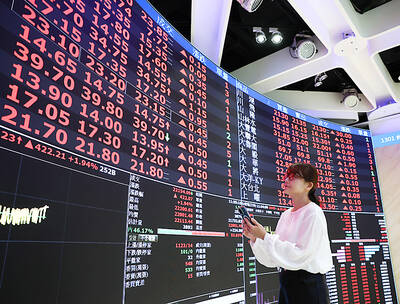Brandname Electronics manufacturer BenQ Corp (
The announcement came as no surprise to analysts as the industry had speculated last month on the possibility of the acquisition.
"BenQ needs cash to offset its losses," said Ken Yu (
Shares of BenQ closed unchanged at NT$12.15 on the Taiwan Stock Exchange yesterday.
BenQ said in a statement yesterday that Ability had agreed to acquire BenQ's digital camera-related assets, including manufacturing equipment and materials at the book value determined on June 30, the day the deal closes.
The electronics maker did not provide any figures about the deal, but said that approximately 70 employees, mostly research and development staff within the digital camera business unit, would be joining Ability starting on June 1.
"Digital cameras are one of our most important and profitable product lines ? Ability will remain as our important strategic suppliers for future BenQ branded digital cameras," BenQ company president Sheaffer Lee (
The disposal of its digital camera business came after BenQ sold its optical disk drive unit to local rival Lite-On Technology Corp (建興電子) last June for about NT$6.2 billion in cash and stock, in a move to further separate brand and contract manufacturing businesses.
Ability, which is one of BenQ camera's outsourced makers, also produces cameras for Samsung Electronics Co of South Korea as well as Casio Computer Co and Nikon Corp of Japan.
BenQ -- which has posted five consecutive quarterly losses -- saw a record loss of NT$27.6 billion (US$825 million) last year after failing to turn around the unprofitable handset unit purchased from Siemens AG.
Last month, BenQ also sold shares which it owned in both AU Optronics Corp (
According to SinoPac's Yu, digital camera volumes of BenQ are estimated at around 300,000 to 500,000 units a year, therefore the volumes will not be massive enough to serve as a boost to Ability.
Meanwhile, CNA reported last night that BenQ had laid off some 100 employees from its handset making division, mainly marketing and research staffers, without citing sources.
It appeared to come as a surprise to the affected employees who were left with less than 30 minutes to pack up and leave, the report said.

UNCERTAINTIES: Exports surged 34.1% and private investment grew 7.03% to outpace expectations in the first half, although US tariffs could stall momentum The Chung-Hua Institution for Economic Research (CIER, 中華經濟研究院) yesterday raised its GDP growth forecast to 3.05 percent this year on a robust first-half performance, but warned that US tariff threats and external uncertainty could stall momentum in the second half of the year. “The first half proved exceptionally strong, allowing room for optimism,” CIER president Lien Hsien-ming (連賢明) said. “But the growth momentum may slow moving forward due to US tariffs.” The tariff threat poses definite downside risks, although the scale of the impact remains unclear given the unpredictability of US President Donald Trump’s policies, Lien said. Despite the headwinds, Taiwan is likely

READY TO BUY: Shortly after Nvidia announced the approval, Chinese firms scrambled to order the H20 GPUs, which the company must send to the US government for approval Nvidia Corp chief executive officer Jensen Huang (黃仁勳) late on Monday said the technology giant has won approval from US President Donald Trump’s administration to sell its advanced H20 graphics processing units (GPUs) used to develop artificial intelligence (AI) to China. The news came in a company blog post late on Monday and Huang also spoke about the coup on China’s state-run China Global Television Network in remarks shown on X. “The US government has assured Nvidia that licenses will be granted, and Nvidia hopes to start deliveries soon,” the post said. “Today, I’m announcing that the US government has approved for us

When Lika Megreladze was a child, life in her native western Georgian region of Guria revolved around tea. Her mother worked for decades as a scientist at the Soviet Union’s Institute of Tea and Subtropical Crops in the village of Anaseuli, Georgia, perfecting cultivation methods for a Georgian tea industry that supplied the bulk of the vast communist state’s brews. “When I was a child, this was only my mum’s workplace. Only later I realized that it was something big,” she said. Now, the institute lies abandoned. Yellowed papers are strewn around its decaying corridors, and a statue of Soviet founder Vladimir Lenin

The National Stabilization Fund (NSF, 國安基金) is to continue supporting local shares, as uncertainties in international politics and the economy could affect Taiwanese industries’ global deployment and corporate profits, as well as affect stock movement and investor confidence, the Ministry of Finance said in a statement yesterday. The NT$500 billion (US$17.1 billion) fund would remain active in the stock market as the US’ tariff measures have not yet been fully finalized, which would drive international capital flows and global supply chain restructuring, the ministry said after the a meeting of the fund’s steering committee. Along with ongoing geopolitical risks and an unfavorable